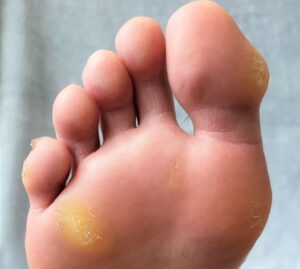
Our feet, marvels of engineering, endure a tremendous amount of stress every day. Sometimes, this stress can lead to uncomfortable and unsightly conditions like corns and calluses. While these two foot problems may seem similar, they have distinct differences. Understanding them and knowing how to treat them can help you maintain healthy and pain-free feet.
Understanding Corns and Calluses
Corns and calluses are thickened layers of skin that develop in response to friction and pressure. They are the body’s way of protecting the skin from injury or irritation. Although they share this common function, their characteristics and locations differ.
Causes of Corns and Calluses
Corns typically form on areas of the feet that don’t bear weight, such as the tops and sides of toes. They can be hard or soft, with the latter often occurring between toes. Calluses, on the other hand, tend to develop on the soles of the feet, especially under the heels or balls. Both are usually caused by:
- Ill-fitting shoes that create pressure points.
- Repeated rubbing or friction, often from tight footwear.
- Abnormalities in gait or foot structure.
- Barefoot activities that expose the skin to excessive pressure.
Risk Factors
Certain factors can increase your risk of developing corns and calluses:
- Foot Deformities: Bunions, hammertoes, or bone spurs can create areas of friction.
- Occupation: Jobs that require long hours of standing or walking on hard surfaces.
- Athletic Activities: Sports that involve repetitive motions, like running or dancing.
- Inadequate Footwear: Shoes that don’t fit properly or lack cushioning.
Signs and Symptoms
Corns are usually small, raised bumps with a hard center. They can be painful, especially when pressed. Calluses, on the other hand, are larger, flat areas of thickened skin. While they’re not usually painful, they can cause discomfort or a burning sensation.
Foot Care for Those at Risk
Preventing corns and calluses involves proper foot care:
- Footwear: Choose comfortable, well-fitting shoes with cushioned insoles.
- Orthotics: Custom-made or over-the-counter inserts can redistribute pressure.
- Moisturize: Regularly apply lotion to keep skin soft.
- Trim Nails: Keep toenails trimmed to prevent them from digging into skin.
- Padding: Use padding or bandages to protect vulnerable areas.
While corns and calluses can often be managed at home, they may require professional attention if they become painful or infected. At DFW Wound Care Center, we specialize in the treatment of various foot conditions, including those related to corns and calluses. Our experienced team is dedicated to providing effective and compassionate care. If you’re experiencing foot discomfort, contact us today to schedule an appointment at one of our clinics in Plano, Lewisville, Irving, or DeSoto. Your foot health is our priority, and we’re here to help you step comfortably.
Contact us
Schedule an appointment
with our specialists by contacting us or calling our:
